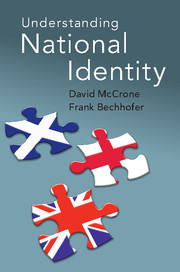Book contents
- Frontmatter
- Contents
- List of tables
- Preface
- Introduction
- 1 Thinking about national identity
- 2 Accessing national identity
- 3 National identity: do people care about it?
- 4 Debatable lands: national identities on the border
- 5 Claiming national identity
- 6 The politics of national identity
- 7 The notional other: ethnicity and national identity
- 8 A manner of speaking: the end of being British?
- 9 Whither national identity?
- Appendix National identity publications
- Bibliography
- Index
1 - Thinking about national identity
Published online by Cambridge University Press: 05 April 2015
- Frontmatter
- Contents
- List of tables
- Preface
- Introduction
- 1 Thinking about national identity
- 2 Accessing national identity
- 3 National identity: do people care about it?
- 4 Debatable lands: national identities on the border
- 5 Claiming national identity
- 6 The politics of national identity
- 7 The notional other: ethnicity and national identity
- 8 A manner of speaking: the end of being British?
- 9 Whither national identity?
- Appendix National identity publications
- Bibliography
- Index
Summary
What is it that is so interesting about national identity that it has intrigued us and dominated our research for some twenty years? Given what has already been published about nations, nationalism and national identity, why inflict yet another volume on readers? One reason is that a lot has been written about nationalism, a fair bit about ‘nations’, but far less about national identity. Consider this statement by the political philosopher Margaret Moore (2006: 98), in a hand-book on nations and nationalism:
It would not be devastatingly dislocational, in a cultural sense, to leave Canada and live in the United States, or to leave Scotland to live in England, and would not involve the traditional costs involved in learning a new language or new symbolic repertoires. But it may be profoundly difficult for the Scot to think of herself as an Englishwoman, or the Canadian to think of himself as an American.
It seems reasonable to accept Moore's premise that it would be fairly straightforward to adjust to the new way of life, but is it more debatable that it would be ‘profoundly difficult’ to acquire a new ‘identity’? One might of course believe that what people choose to call themselves is neither here nor there, that national identity does not really matter. We think that it does matter, and that Moore is right in her surmise. It may well be that in the two examples she gives the migrant's behaviour does not actually change very much, because so much of the new life and its meanings are familiar. How people identify themselves in national terms is another matter entirely. We know, for example, from interviews with Scots who migrate to England, and English-born people who come to live in Scotland, that their country of origin, where they were born and brought up, confers on them a powerful sense of who they are.
- Type
- Chapter
- Information
- Understanding National Identity , pp. 6 - 21Publisher: Cambridge University PressPrint publication year: 2015



